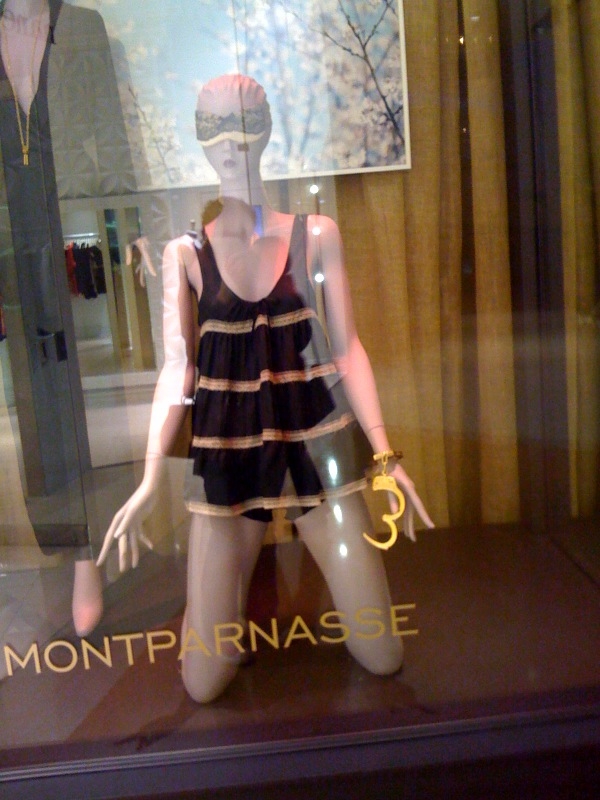Last night some friends and I were on the Strip here in Vegas and wandered over to look at City Center, the new casino/very high-end shopping center/”walkable city within a city” that was such a big deal when it opened recently that national news outlets, including NPR, talked about it. Anyway, we were wandering around and came upon a lingerie store with this mannequin in the window:
She’s blindfolded, handcuffed, on her knees. Another mannequin was also blindfolded, with ties around her ankles, and a third had a long pearl necklace wrapped around her neck and then tied around each wrist.
Our reaction was, basically, “Agh! Agh! WTF? Why?!?” We all, men and women alike, interpreted it as an icky depiction of sexual domination of women, perhaps even violence.
But of course, there’s another way to interpret it, particularly given that it’s a lingerie store: as consensual participation in S&M/bondage or sexual role-playing.
I still can’t shake off my initial feeling. We often see implied, or obvious, violence toward or sexual harassment of women as marketing or entertainment (see the trailer for the movie Bounty Hunter, vintage Betty Crocker ad, PSA for labeling cleaning products, violence against women in prime time, ad for CSI, t-shirt to show team spirit, ad for shoelaces, Lanvin ads, trailer for Dead Girl, Barney’s window display showing splattered blood and mannequins under attack, is stalking romantic?, trailer for Observe and Report, Rene Russo photo shoot, ha ha! She wasn’t being beaten!, “going in for the kill has never been so satisfying”, oops, I strangled a woman, and…oh, there are many more, but I don’t have time to link to them all). It seems naive to think that people can see mannequins posed like this and completely disconnect them from other portrayals of women bound, gagged, dead, sexually assaulted, etc., that are meant to be funny or sexy.
But it also seems problematic to dismiss the idea that in at some situations, such as this one, the situation could be consensual S&M. Allusions to at least light bondage has become more common in pop culture, particularly handcuffs as a sexy prop (sometimes used for laughs if one partner ends up handcuffing the other to something and then robbing them, stealing their clothes, etc.). Yet those who participate in S&M are also often stigmatized as sexual deviants.
But then, how do we think about S&M/bondage given that the sexual norms common in the U.S. include the idea of female sexual passivity and submission? Is this mannequin problematic in any way even if the store meant to invoke the idea of sexual role-playing?
I am confounded by this. The mannequin creeps me out. I don’t like it. But I’m sure many people can make eloquent arguments against my reaction, or how we approach the various issues involved. So what to make of this mannequin, readers? Help me out.
NEW! (Mar. ’10): SOM sent in this photo of the display in the window of the shoe store Sole Experience in Edmonton, Alberta, that shows a woman in high heels with her feet bound. This image, to me, seems to more clearly imply violence than the one above, possibly because of the use of rope rather than handcuffs, which are associated with sex role-playing:


